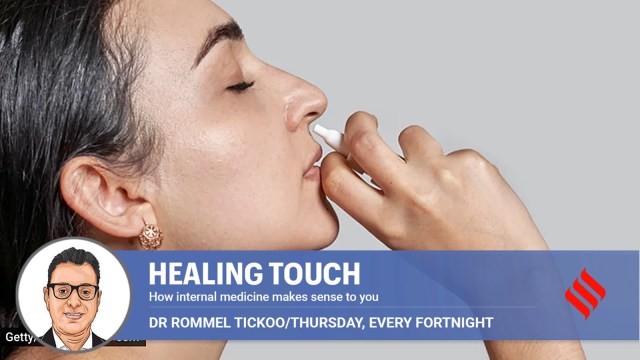- India
- International
Are you using the right nasal spray for your blocked nose and sneezing bouts?
Consult a doctor on what you need instead of your pharmacist, says Dr Rommel Tickoo, Director, Internal Medicine, Max Super Speciality Hospital, Saket, New Delhi
 There are different groups of nasal sprays with different effects and medications to target specific symptoms. (Representational File Photo)
There are different groups of nasal sprays with different effects and medications to target specific symptoms. (Representational File Photo)As the days get warmer and the pollen floats about this time of the year, we are seeing more and more patients showing up at the OPD with seasonal allergies. Almost all of them have congestion, a runny and itchy nose and uncontrollable bouts of sneezing. And almost all of them say they bought nasal sprays over the counter and trusted their pharmacists but the symptoms have somehow persisted. Such sprays are not one-size-fits-all and used indiscriminately, they can cause problems.
Each allergy is different and needs a different nasal spray
Nasal allergies are of different kinds. The seasonal ones are usually a reaction to allergens like pollen and grass. Perennial allergies are a result of your reaction to dust, mold, pollutants, mites or ticks. Viral infections may result in a stuffy nose and nasal drips, when you swallow the mucus at the back of the throat.
There are different groups of nasal sprays with different effects and medications to target specific symptoms. And they have limited dosage prescribed on their labels though many end up overusing them.
When you are not sure of the trigger, go for saline sprays to clear your nasal chambers of mucus. These do not contain any chemicals and do not have side effects. Many make the classic mistake of going for decongestants but they must be taken only on the advice of a doctor depending on the severity of symptoms and should not be used more than three days. They work by narrowing down blood vessels in the nose, which helps relieve inflammation and allows airways to open up. Overuse results in a condition called rhinitis medica mentosa, where exposure to chemicals results in rebound congestion, causing irritation and inflammation in your nasal passages.
Another common nasal spray is the one that uses antihistamines, which work by blocking the effects of histamines or chemicals that react to allergens and trigger symptoms.

In some stubborn, long-term cases of severe allergies, which interfere with your day-to-day functioning, doctors prescribe steroid-based nasal sprays to reduce drips and inflammation. These can be administered for 10 to 15 days and can even be extended up to three months. In some cases, there is a need for maintenance therapy on and off.
When sprays and antihistamines do not work, then there is no option but to go for immunotherapy. For this you need to consult an allergist who can identify the trigger through a series of tests and then suggest targetted therapies.
The right way to use nasal sprays
Make sure to press the nozzle in such a manner as to deliver a small amount of medication directly to the lining of the nose. Direct it towards the back of the nose to make sure the medicine reaches your sinuses and eases the congestion. Inhale gently before pressing the pump to ensure that the product remains inside your nose. Don’t direct it at the septum which can be damaged by the jet effect. Don’t tilt your head back or the medication could drip down the back of your throat. Most importantly, never keep your spray bottles beyond their expiry date. Since the medication is liquid, it could easily get contaminated with dirt and bacteria.
Apr 04: Latest News
- 01
- 02
- 03
- 04
- 05





























